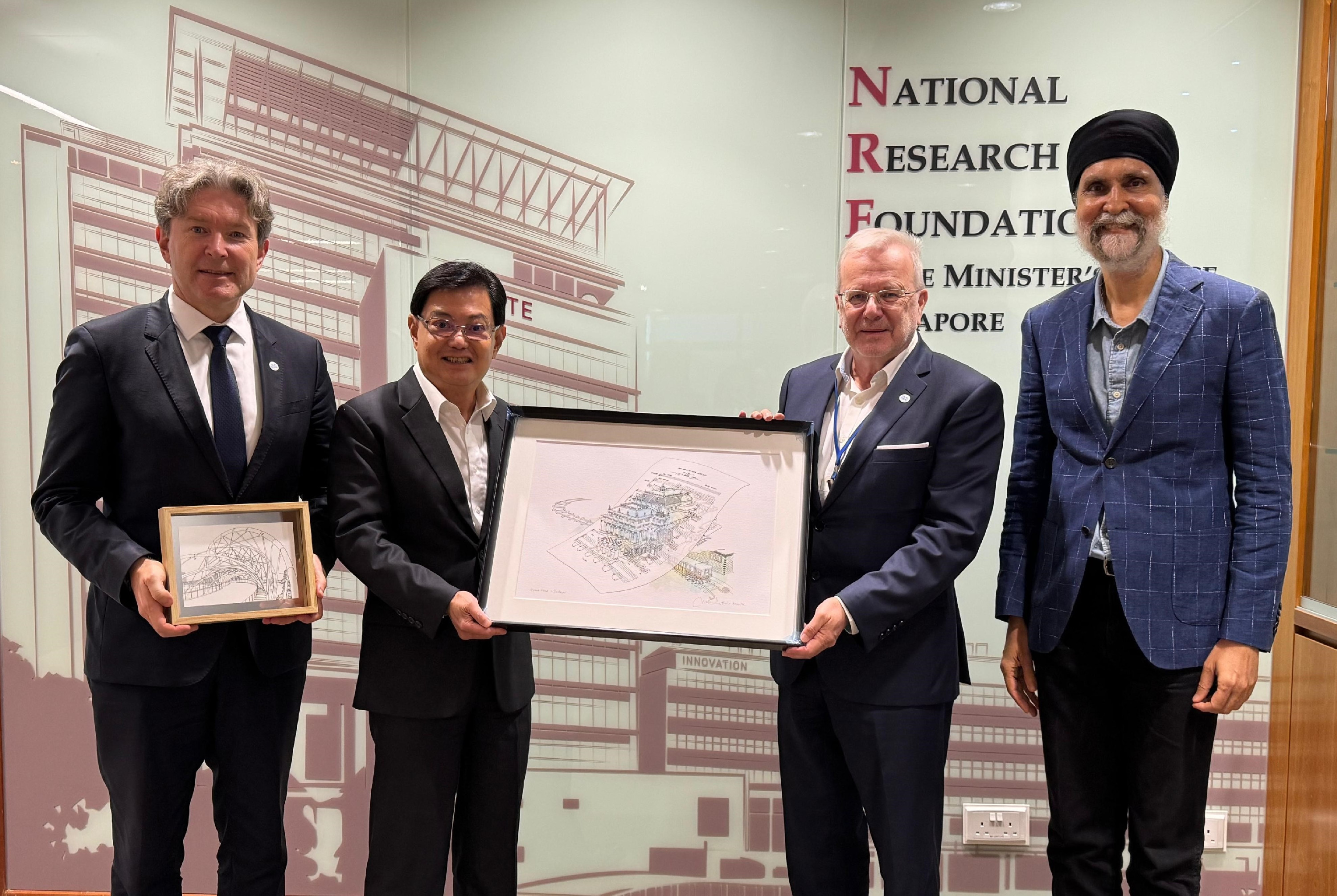ELTE’s Initiative Could Further Strengthen the Competitiveness of Research in the Natural Sciences and the Humanities
Interview with Balázs Gulyás on the renewal of the research network and Eötvös Loránd University’s (ELTE) proposal to take over four of HUN-REN’s humanities and social sciences research centres. According to the President of HUN-REN, ELTE’s initiative could benefit all parties involved – creating a genuine win-win situation.
The renewal process of the research network, which began last year, has taken several unexpected turns in recent months – it’s fair to say that HUN-REN has had a demanding year, as have you as its President. Where does the renewal stand now?
The past period has indeed been remarkably intense. In January 2024, we launched an international review of HUN-REN, in which more than 100 Hungarian and international experts assessed the network’s operations and performance. Based on their findings, we presented our vision for the future structure of the research network to the Government last autumn. As a result, in December, Parliament adopted the new HUN-REN Act, which provides the competitive and flexible operational framework we had requested. The Government also committed to doubling HUN-REN’s budget over the next three years—bringing it to HUF 100 billion per year – and the General Assembly of the Hungarian Academy of Sciences adopted a majority decision in support of the state purchasing the properties currently used by the research institutes and transferring them to HUN-REN free of charge, with the obligation that they continue to be used for public research purposes.
At the end of last year, it seemed that everything was progressing according to plan and moving in the right direction. What has happened since then?
Indeed, we continued our work into the new year with great optimism, including detailed preparations for the transition to the new organisational structure. It was during this process that, quite unexpectedly, Academician Sándor Radnóti filed a lawsuit at the end of January challenging the General Assembly of the Academy’s decision – with the clear intention of delaying the transfer of the property assets. This caused an unforeseen setback in the renewal process, as resolving the ownership status of these properties is crucial for our ability to operate competitively. As a result, the new organisation could not be established, nor could the performance-based funding agreement be concluded, while the fate of the properties remains uncertain. In the early months of the year, I had the sense that all parties involved shared a hopeful expectation that the court case would be resolved quickly and that we could move forward. However, it has since become clear that this is not the case: on 11 April, Sándor Radnóti filed another appeal, and there has been no progress since. Our transformation process, along with the associated pay rise planned for the first phase, has reached a deadlock.
And was it in this situation that Lénárd Darázs, the newly appointed Rector of ELTE, came forward with the intention of taking over the humanities research centres? At least, that’s what recent news reports have suggested.
The two processes are independent of each other. Since his election as Rector in February, we have been in active discussions with Lénárd Darázs, as he had already stated in his application that he intended to elevate cooperation between ELTE and the research network to a strategic level.
Did these discussions lead you to the conclusion that the humanities and social sciences research centres could be run more effectively as part of ELTE?
Not exactly. Both our own internal assessments, conducted in 2023–2024, and the findings of the international review pointed to a very low level of collaboration between disciplines and research centres. Nevertheless, throughout the renewal process, we continued to advocate for keeping the network together. The evaluations provided by leading researchers involved in the international review also highlighted that the humanities and social sciences research centres already have close ties with universities, and that these should be further strengthened. While no recommendation was made regarding their transfer to a university – understandably so, as this was not the focus of the scientific assessment – numerous observations were made about the need to deepen cooperation with universities.
In recent months, several parallel developments have started to point in the same direction. Over the past four to five months, the HUN-REN leadership has held in-depth discussions with the Ministry of Culture and Innovation on what a new performance-based funding agreement for the research network might look like. During these consultations, it became clear to both parties that the expectations placed on natural sciences and humanities research – and on their respective research centres – require fundamentally different approaches. The criteria for expectations must be defined differently: in the natural sciences, performance can be measured using internationally published high-quality papers, patents, industrial revenues, collaborations with companies, and income from commercialisation. In the humanities and social sciences, however, these indicators are not applicable. The funding structures also differ: while the natural sciences typically require investment in laboratories and the procurement of equipment, such cost categories generally do not arise in the humanities.
In recent months, we have also taken a close look at the actual level of collaboration among our humanities and social sciences research institutes. We had to conclude that we are effectively dealing with two separate networks. While there is at least some collaboration among the life and physical sciences institutes – joint publications account for nearly 10% – the proportion of joint publications between natural sciences and humanities institutes is below 1%. This is negligible; in effect, there is no meaningful cooperation between these two major fields of science. At the same time, in the humanities and social sciences, the rate of joint publications between HUN-REN institutes and those of ELTE stands at 13%. Unfortunately, the often-invoked notion of a unified network exists only on paper. Perhaps it is no coincidence that many research networks around the world – such as the German Helmholtz Association, the Dutch TNO and Singapore’s A*STAR – focus exclusively on the natural sciences. And there are many more examples one could mention.
The key point is that, throughout the planning of how the renewed HUN-REN would operate, we were repeatedly confronted with the fact that the research centres of the two major fields of science require entirely different approaches and modes of management.

So did Lénárd Darázs offer a competitive alternative on behalf of ELTE?
Yes, he made a surprising yet logical proposal. It became clear to us that the newly appointed Rector of ELTE is committed to raising the university’s scientific performance, particularly in the humanities and social sciences. Following several months of discussions, the Rector put forward a serious and well-considered proposal regarding our four humanities and social sciences research centres. This proposal includes full guarantees that these centres will be able to continue their work under increasingly favourable and competitive conditions while maintaining their institutional integrity. For ELTE, taking over these research centres represents a major opportunity for advancement, both within the Hungarian academic landscape and on the international stage, while the researchers involved would be able to continue their work as before.
While ELTE’s proposal was certainly unexpected and novel, it is important to acknowledge that this issue has appeared on the research network’s agenda before. Even during József Pálinkás’s presidency of the Academy, the idea of affiliating the relevant institutes with universities was raised, and the same possibility emerged again during the establishment of the Eötvös Loránd Research Network (ELKH). This alternative has been present in our thinking all along, but never before has such a concrete and tangible proposal been put forward as the one ELTE has now presented.
What guarantees did Lénárd Darázs offer?
First and foremost, he is committed to maintaining the four research centres and their twenty affiliated institutes as a single entity. According to his proposal, they would continue to function as intact units within ELTE, just as they currently do. Their legal status and operational autonomy would essentially remain as they were under the HUN-REN proposal. The research centres would retain their funding and independence, operating under the direct authority of the Rector as organisational units with legal personality. This would enable them to continue applying for grants, exercising employer rights, and managing their finances, just as they do now.
ELTE requested guarantees from both the Government and HUN-REN to ensure that the financial and infrastructural resources needed for the operation of the research centres would be secured not only for 2025, but also in the longer term. The Governing Board, for its part, asked the minister responsible for overseeing ELTE to explore the possibility of allocating sufficient budgetary resources to enable the university to implement appropriate salary increases in support of the development of the humanities and social sciences research centres to be transferred to ELTE.
The research centres would be hosted by a 390-year-old university, renowned for its autonomy, prestige and dedication to science. The researchers and institutes would continue their work under the same conditions, but in a more suitable environment. While I understand the concerns surrounding the change, I firmly believe that, in the right hands and under the right circumstances, the research centres will have every opportunity to flourish.
How would all this affect the staff of the research centres concerned? What changes would they notice?
The staff would continue their research at Hungary’s largest and internationally recognised university, within the same institutes and on the same projects as before. Their current leadership would also remain in place. In practice, they would notice no substantive changes. As part of ELTE, they would retain their employment status, with the same job descriptions, benefits and responsibilities. The positions of the Directors General would also remain unchanged and, as I mentioned earlier, their operational autonomy would continue to be fully guaranteed.
What was the reaction of the research network’s institutional leaders to the proposal?
Last week, I personally discussed ELTE’s proposal with the Directors General of the relevant research centres, the heads of all institutions, and the Chair of our International Advisory Board. Throughout these conversations, I found that my position was clearly understood and met with openness. However, all parties emphasised that, should the HUN-REN Governing Board decide to support ELTE’s proposal, this must under no circumstances open the door for universities to start seeking to take over certain natural sciences centres and institutes. I reassured all our leaders that this is simply not an option. Just as ELTE has guaranteed in its proposal that the integrity of the humanities and social sciences centres would be preserved, the unity of the natural sciences centres must likewise remain intact. The Governing Board would not support any such decision – now or at any point in the future.
The reactions from staff and institute directors indicate that the transformation is not yet widely supported.
This is entirely understandable – challenging the status quo inevitably provokes resistance. It is not an easy decision even for those researchers who have taken on leadership roles, as evidenced by the 6:2 vote of the Governing Board, which also led to three resignations. However, it is important to bear in mind that in structural transformations of this kind, it is no accident that the law vests decision-making authority and the associated responsibility in the governing bodies. The Hungarian Academy of Sciences itself has implemented internal reforms that were not universally welcomed by those affected. This is the burden of leadership – and it is time that will ultimately determine the wisdom of our decisions.
Those affected were mainly concerned about the speed of the decision.
Over the past two years, we have conducted a comprehensive review in line with international standards, analysing, evaluating, benchmarking, and planning operations and processes accordingly. We are fully familiar with the performance and operational characteristics of the institutions concerned. As I mentioned, this issue has appeared on the agenda before. The views of the involved staff and middle management were known and clearly perceptible, and the research network's Governing Board made its decision in full awareness of them. It was a difficult decision for us too, but the majority firmly believes that it is a safe and forward-looking step for the research centres, the relevant disciplines, and ultimately the researchers and their support staff.
And what can we expect regarding the transformation of HUN-REN? Will it finally go ahead? Will there be a pay rise?
The Governing Board not only discussed ELTE’s initiative, but also addressed the fact that the organisational renewal – delayed by the ongoing legal dispute over property ownership – and the associated increase in funding, including salary raises, can no longer be postponed. In a formal resolution, the Governing Board called on Minister Balázs Hankó to urgently ensure this year’s planned HUF 18 billion funding increase for the research network and to initiate the establishment of the new HUN-REN, even if the property transactions with the Hungarian Academy of Sciences remain unresolved.
In a separate resolution, the Governing Board also reaffirmed its commitment to preserving the unity of the natural sciences research centres. It is important to understand that the structure of a research network is constantly evolving – this is entirely natural and widely accepted practice around the world. If this were not the case, it would suggest that those in charge were not fulfilling their responsibilities. In recent years, this evolution has primarily taken the form of expansion; for example, the Bay Zoltán Research Centre has joined the network, and further discussions are under way regarding the potential integration of additional highly competitive research institutes in the field of natural sciences. The Governing Board’s statement signals a long-term commitment: under no circumstances does it intend to part with the network’s key life and physical sciences research centres.
What will happen to the properties owned by the Academy under the current circumstances? Yesterday, the President of the Academy indicated that they may need to review the validity of the General Assembly’s resolution.
In our view, the resolution of the General Assembly is entirely unambiguous. It is worth quoting directly: “The General Assembly supports the sale of the [...] properties by the Hungarian Academy of Sciences to the Hungarian State for a purchase price of HUF 74.5 billion, with the express purpose that these properties should become – and remain – the property of the research network currently using them, in the continued service of Hungarian scientific research.” This means that the properties, once acquired by the State, must be transferred to HUN-REN in their entirety and must continue to serve research purposes. Both conditions can still be fulfilled, and that remains our intention. ELTE’s proposal concerns the future use of the properties: should HUN-REN become their legal owner, it would guarantee that the research centres may continue to use them free of charge and in the long term. That is exactly what we will do.

